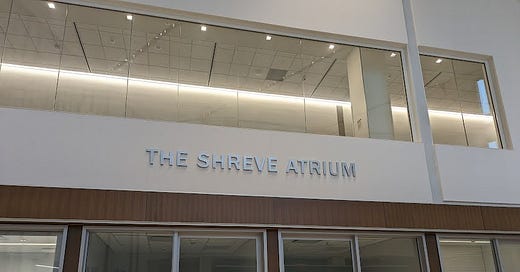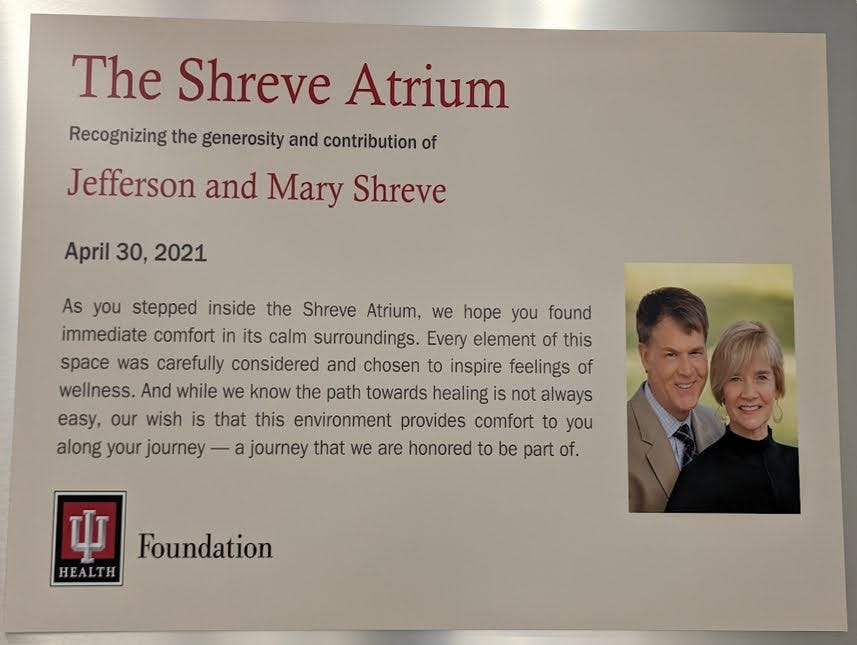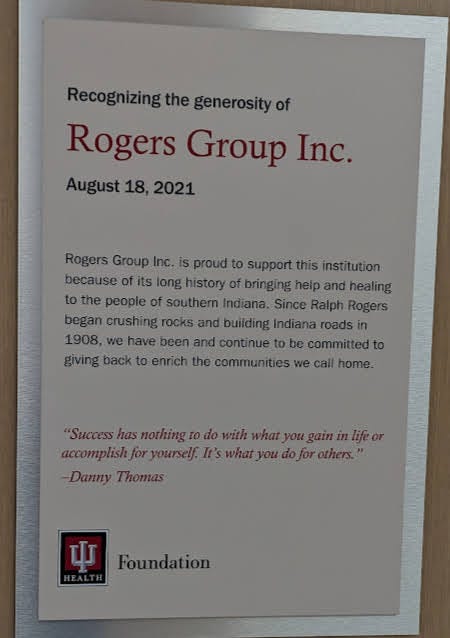Reflections From a Hospital Room
On public health, what charitable giving actually buys, and why you're not getting a new podcast episode this week.
The Shreve Atrium welcomes visitors to the gleaming, newish (opened in late 2021) $557 million IU Health Regional Academic Health Center in Bloomington. I didn’t find this out until later. We came in through the emergency entrance.
Now, I don’t typically use this space to talk about my personal life, and I certainly don’t use it to talk about my family. I mean, I briefly mentioned a rough patch in my marriage during one of my earliest posts (just reread it for the first time in a while - I’m really proud of that one), and that same difficult stretch came up again in a recent podcast episode I recorded with author Jared Yates Sexton. But, generally speaking, we’re private people who don’t air our business. I come here to talk about the bigger picture, and I’d like that work to stand on its own merits. Rest assured though, because politics has a way of appearing everywhere, this piece will turn to that topic by the end.
But first I want to talk about my son. He’d probably be embarrassed if he knew I was talking about him, but he’s a badass and I’m gonna brag.
In his 19 years, he’s spent a lot of time in hospitals. Born with a host of congenital anomalies, the details of which I will spare you, he spent his first three months in the neonatal ICU at Children’s Memorial Hospital (now Lurie Children’s) in Chicago. He has always taken his nutrition via G-tube, and has used a wheelchair since he outgrew his stroller. My baby boy has been poked, pricked, and prodded by every specialist across the medical spectrum; connected via tube, hose, or electrode to every machine short of the iron lung. He’s had physical therapy, speech therapy, occupational therapy, respiratory therapy, and psychotherapy.
And then there are the surgeries.
Besides the operations necessary to keep him alive in his infancy, he’s had several school breaks interrupted by inpatient stays. First, a cholesteatoma removal stole winter break when he was in kindergarten. Spring break in third grade belonged to patellar dislocation surgery, which didn’t heal properly, messed up his whole summer, and needed a second procedure. After sixth grade, severe scoliosis required a complete spinal fusion with titanium rods inserted in his back, not so much to correct the condition as to arrest further progression. A couple years later, he’d have to have a minor operation to cut off the top inch or so on one of those rods so it didn’t protrude through his skin. He got an extended winter break his sophomore year of high school, which might have been fun if he hadn’t been at Riley having surgery on his, um… okay, I will have embarrassed him enough already.
Despite the many obstacles placed in his way - and with the love and support of his extended family, dedicated medical professionals, and committed educators - he has persevered. Like other kids his age, he loves video games, social media, and cartoons geared toward adults (which is a totally different thing than adult cartoons). He completed high school in 2022 with a Core 40 diploma - just like most Hoosier graduates - and recently finished his first semester at Ivy Tech Community College. I tell him how proud I am frequently, and I still can’t say it enough.
Most of our inpatient hospital stays have been planned. This one wasn’t.
The couple weeks leading up to Christmas, he had been taking the occasional nap during the day. While I live for a good afternoon nap, this wasn’t like him. Still, he didn’t show any other signs of something being wrong. No cough. No fever. No congestion. Just fatigue. He was just finishing his first semester of college; days were getting shorter as winter approached - napping season; preferences and routines change. The napping was unusual, but explainable - certainly nothing urgent, right? We had a regular checkup with our primary care provider first thing in the morning on the 27th, so we could bring up the fatigue then.
By the morning of that appointment, he was having a difficult time getting a full, deep breath. He was showing signs of hypoxemia, so his nurse practitioner placed him on oxygen and called for medical transport. Despite his lengthy medical history, this was his first ambulance ride. In the emergency department, he was given a series of tests and scans, showing signs of sepsis - a potentially-fatal reaction to severe infection. He must have had walking pneumonia (rolling pneumonia?👨🦼) for weeks - the contagion slowly taking over his lungs just outside our detection until it was nearly too late. His mom, stepmom, and I could’ve spent the day beating ourselves up over our collective failure to have figured that out, but self-flagellation had to wait. Guilt surrendered to worry. By that evening he was in the ICU on a ventilator.
We’ve now been here nearly two weeks. He has improved slowly, but surely, every day. The infection has cleared. His lung function continues to progress. My guilt is somewhat assuaged knowing a case of pneumonia like this damn near killed an otherwise-healthy former Olympian. At the current rate, we’ll have that breathing tube out tomorrow and be discharged by the end of the week. With all due credit to his nurses, doctors, respiratory therapists, and his entire care team - who have been astounding - my guy has been determined to get out of here and has fought like a champ to make it happen. He’ll be ecstatic to finally roll out those doors, and I will be equally ecstatic to follow him out. His mother and I have essentially lived here this whole time. I’ve made countless trips through that Shreve Atrium.
And I’m tired of looking at this dude’s goofy mug:
Jefferson Shreve is, by all accounts, an exceptionally nice guy. He is also a tremendously successful businessman, having founded Storage Express, a chain of over 100 self-storage properties that, at its high point, had facilities in Indiana, Illinois, Kentucky, Ohio, and Tennessee. After divesting of the Tennessee assets in 2021, he sold the rest of the company to Extra Space Storage in 2022 for $590 million. Shreve was then appointed to the board of directors of the Utah-based conglomerate. Previously, he has served as both treasurer and chairman of the Self Storage Association - the industry’s trade group and lobbying organization - as well as serving parts of two terms on the Indianapolis city council. This past November, Shreve was the Republican candidate for mayor of Indianapolis, losing to the two-term incumbent, Democrat Joe Hogsett, by a margin of nearly 20 points despite spending $13.5 million of his own money in the most expensive mayoral race in the city’s history.
A prolific philanthropist, Shreve’s financial contribution was the lead gift to IU health for the new hospital, providing - along with matching contributions from other sources- a total $3 million toward the project, the “largest-ever private gift to IU Health Bloomington. Across town, Shreve’s name adorns the 400-seat lecture hall on Ivy Tech’s Bloomington campus after years of giving to that institution. The entrance to this medical facility in which my son has resided these past weeks isn’t even the only Shreve Atrium in the state - the lobby of the Schwitzer Student Center at the University of Indianapolis shares its name. I do not doubt the sincerity of Shreve’s philanthropy.
I do, however, doubt the following statement, courtesy of WBIW Bedford: “Jefferson Shreve has long supported the mission of IU Health Bloomington, serving on both the hospital board and the board of the Bloomington Hospital Foundation. He and his wife Mary are committed to the health and well-being of Hoosiers in south-central Indiana.”
Really, Jeff? Then why do you keep financially supporting Republican candidates and policies that actively make the lives of Hoosiers worse? The Indiana GOP has had a monopoly on power in the this state for most of the last 20 years as our public health rankings have gotten worse.
A 2022 study published by the British Medical Journal, using U.S. county-level election results and CDC data concludes “that Democratic counties have experienced steeper declines in mortality than Republican counties over the past two decades,” and this research “builds upon previous evidence suggesting that more liberal policies, laws, and regulations may be associated with better health outcomes.” Interesting tidbits from the accompanying article include:
“The gap in overall death rates between Democratic and Republican counties increased more than sixfold from 2001 to 2019, especially for white populations, and was… largely driven by deaths due to heart disease, cancer, chronic lung disease, unintentional injuries (including drug overdoses), and suicide.”
“The gap in mortality rates between Republican and Democratic counties jumped by 541%, from 16.7 per 100,000 in 2001 to 107 deaths per 100,000 in 2019.”
“Rural Republican counties experienced the highest mortality rates and the least improvement over the study period, suggesting that the political environment has an important role to play in the widening urban-rural mortality gap.”
Shreve has boasted about his NRA membership and “A” rating from the lobbyist group/Russian money-laundering operation. This, despite the fact firearms are the leading cause of death among children in this country and gun violence has been described as “a public health scourge that threatens the safety and lives of every American.”
He has long opposed women’s right to make their own healthcare. In 2016, while running for State Senate, Shreve touted his “commitment to protect the unborn". I don’t know, Champ, how about we work on protecting the born, living, breathing adult women who’ve been put in danger by Indiana’s Republican supermajority? Abortion bans kill women.
Shreve continues to bankroll MAGA candidates like Mike Braun, who rejects commonsense public health policies like masking and vaccine requirements. Another recipient of the storage mogul’s largesse, Mike Pence, was largely responsible for worsening an HIV outbreak in Scott county during his gubernatorial reign.
And then there’s Trump.
A press release from the Indiana Democratic Party notes, “Jefferson was one of Donald Trump's original supporters, going to the Republican National Convention to support his nomination in 2016. Years later, Jefferson is still standing by Trump. He never condemned the violent insurrection on our Capitol and the attempted overturning of the 2020 election. In fact, Jefferson's donation history shows he's rewarded election deniers with campaign contributions, even donating after the attack on the Capitol.” For someone so concerned about the health and well-being of Hoosiers, he’s awfully reticent to back away from a man whose mismanagement of the COVID pandemic killed at least 400,000 Americans.
Look, I don’t wanna keep picking on Shreve. It’s bad enough the guy comes off like an alien wearing a human suit. Besides, his plaque is not alone in the hospital entryway.
“Ralph Rogers began crushing rocks and building Indiana roads in 1908,” it says. His three grandsons inherited the company in 1976, and have used their generous patrimony to crush democracy and build oligarchic power in the Republican Party. One of those grandsons, Richard Rechter - the now-retired chairman of Rogers Group - has spent over $200,000 in Indiana alone on political contributions, almost entirely for Republican candidates and conservative causes. Zoom out to the national level and that total grows considerably. Richard’s brother Ben R. and his son Ben L. also sport a lengthy history of conservative political spending between them, while the other brother, Sam, gets in on the action, too. Wives, kids, the company’s political action committee, and the industry’s trade group - they’re all in on buying supporting the Republican politicians who enact policies detrimental to public health. I’m sure the tax breaks are nice, though.
But again, I do not doubt the sincerity of anyone’s philanthropy. They probably think they’re doing the right thing. Living in a bubble of wealth can do that to people. It’s the system that’s rotten. Of course, former President Teddy Roosevelt knew better, stating, “of course no amount of charities in spending such fortunes can compensate in any way for the misconduct in acquiring them.” Right? Who built the system? And how? University of Tennessee professor Eric Franklin Amarante nails down the problems of relying on charity to do work that should be performed by government:
“For over a century, philosophers, politicians, and sociologists have bemoaned philanthropy's inherent antidemocratic, paternalistic, and amateuristic aspects. The antidemocratic nature of philanthropy is self-evident: When a wealthy person determines the best way to address a societal problem without the input of either society at large or the intended beneficiaries of the philanthropy, the result is a deficit of democracy. Philanthropy's amateurism stems from the illogical belief that wealthy individuals ought to address some of the world's most complex and intransigent problems simply because they successfully amassed a fortune in the private sector. The paternalism critique focuses on the assumption that many of society's problems are born out of the personality faults of charity beneficiaries.”
Exactly. When we rely on affluent individuals to endow important functions, we - as a society - surrender agency to these plutocrats such that only the projects they consider important get done. You will not be surprised that the rich don’t always share the priorities of the population at large. From, Daedalus, an open access publication of the American Academy of Ars & Sciences: “Economic inequality created the very system that made big philanthropy possible. Under the circumstances, it is hardly surprising that contemporary philanthropy is largely unconcerned about growing economic inequality.” That is to say, those with exceptional wealth are not particularly interested in addressing the very root cause of charitable need.
Furthermore, we assign competence to the wealthy based solely on their net worth. They may excel at separating fools from their money (or have been born into riches), but it turns out that skillset may not translate to high-minded endeavors like building a fairer, more just society. “The most successful people are not the most talented, just the luckiest,” according to a study profiled in the MIT Technology Review. It’s science.
Countless patients in this beautiful, state-of-the-art facility probably worked themselves ragged over the course of their lives laboring to enrich the ownership class, only to wind up with chronic disease and lifetime of medical debt, harvested for profit by insurance companies, drug and device manufacturers, and AHEM hospital monopolies that waste money on administrative bloat which could be better spent on patient care . Their luxuries are paid for with our lives.
If our propertied overlords were really “committed to [our] health and well-being,” they’d advocate not just for universal, government-run health insurance, like every other developed nation in the world, but for all of the other things that contribute to human wellness - clean air and water, affordable fresh food, well-paying jobs, quality education, safe people-centered communities - you know, everything Republicans stand against. They’d lobby popularly-elected representatives from fairly-drawn districts to fund these priorities, get out of the way so an efficient bureaucracy, staffed by experts in their fields and subject to democratic oversight, could implement such a system in a just, equitable fashion - and they’d happily PAY THEIR FUCKING TAXES to make it happen.
Instead, they pay to put their names on things.
Due to his disabilities, my son receives Medicaid. That’s the only reason we won’t be walking out of here with a six (seven?) figure bill. More than half a million Americans this year will not be so fortunate, falling into bankruptcy due to overwhelming medical debt. It shouldn’t be this way. No one should be required to suffer a permanent handicap in order to receive necessary care without the looming threat of financial ruin. Our healthcare system is deathly ill with a bad case of capitalism, and the only known cure is democracy.








Thank you for sharing a difficult personal story to illustrate the broader systemic dysfunction of our healthcare system.
I wish only the best for your son...his father's courage must surely bolster his own.
such a good piece - thank you for sharing. A very good point - too many don't think of this or forget about it: "When we rely on affluent individuals to endow important functions, we - as a society - surrender agency to these plutocrats such that only the projects they consider important get done. You will not be surprised that the rich don’t always share the priorities of the population at large."